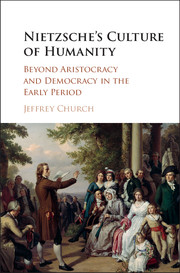Book contents
- Frontmatter
- Dedication
- Contents
- Preface
- List of abbreviations
- Introduction
- PART I The Foundation of Culture in the Early Nietzsche
- Part II Two Concepts of Culture in the Early Nietzsche
- 4 Nietzsche's Exemplary Individuals
- 5 National Culture
- 6 Cosmopolitan Culture
- PART III The Means to Culture in the Early Nietzsche
- PART IV The Significance of the Early Period
- Bibliography
- Index
4 - Nietzsche's Exemplary Individuals
from Part II - Two Concepts of Culture in the Early Nietzsche
Published online by Cambridge University Press: 05 October 2015
- Frontmatter
- Dedication
- Contents
- Preface
- List of abbreviations
- Introduction
- PART I The Foundation of Culture in the Early Nietzsche
- Part II Two Concepts of Culture in the Early Nietzsche
- 4 Nietzsche's Exemplary Individuals
- 5 National Culture
- 6 Cosmopolitan Culture
- PART III The Means to Culture in the Early Nietzsche
- PART IV The Significance of the Early Period
- Bibliography
- Index
Summary
In Part 1, I examined Nietzsche's positive ethical view of the good life, which forms the foundation of his defense of culture. I argued that Nietzsche does not ground his ethics on nature or on strength or authenticity of will, but rather, we saw, on a normative standard of humanity that transcends nature and any particular will. Like Aristotle, Nietzsche defends a teleological or perfectionist ethics according to which the good human life is the one that actualizes our distinctive human potential. However, Nietzsche argues in contrast to Aristotle that human nature is divided between two ends, perfection and harmony. The life lived in accordance with nature is contradictory and ultimately meaningless. As such, we require a justification to remain in existence. Fortunately, human beings are distinctive among the animals in being self-determining. That is, we need not adopt a purpose from our natural instinct but can give ourselves our own ideal to live up to. In this way, Nietzsche adopts a modern perfectionist ethics in the Kantian tradition. The life devoted to humanity's self-determination can transcend nature and involves the creation of a new type of human life that can serve as an exemplary model for others. The exemplary individual who creates this type unifies his nature by perfecting his humanity and by harmonizing his drives into an integrated character. In doing so, the exemplary individual leads a good life and redeems human existence.
In Part 2, we turn from the foundation of culture to the nature and character of Nietzsche's culture, the community that fosters the good life for human beings. The “fundamental idea of culture” (Grundgedanke der Kultur), Nietzsche states, is “to promote the production” of exemplary individuals, in particular, “the philosopher, the artist, and the saint” (UM.3.5). This transitional chapter is concerned with the particular character of the exemplary individual. Who is this individual? More specifically, why is Nietzsche insistent that this individual must be a philosopher, artist, or saint? Once we have fleshed out the exemplary individual – the end or purpose of culture – we will proceed in Chapters 5 and 6 to what I will argue are the two concepts of culture in Nietzsche's early thought. Nietzsche does not himself explicitly disentangle these two concepts, but it is necessary to keep them distinct in order to grasp the unity and contribution of Nietzsche's theory.
- Type
- Chapter
- Information
- Nietzsche's Culture of HumanityBeyond Aristocracy and Democracy in the Early Period, pp. 83 - 120Publisher: Cambridge University PressPrint publication year: 2015

